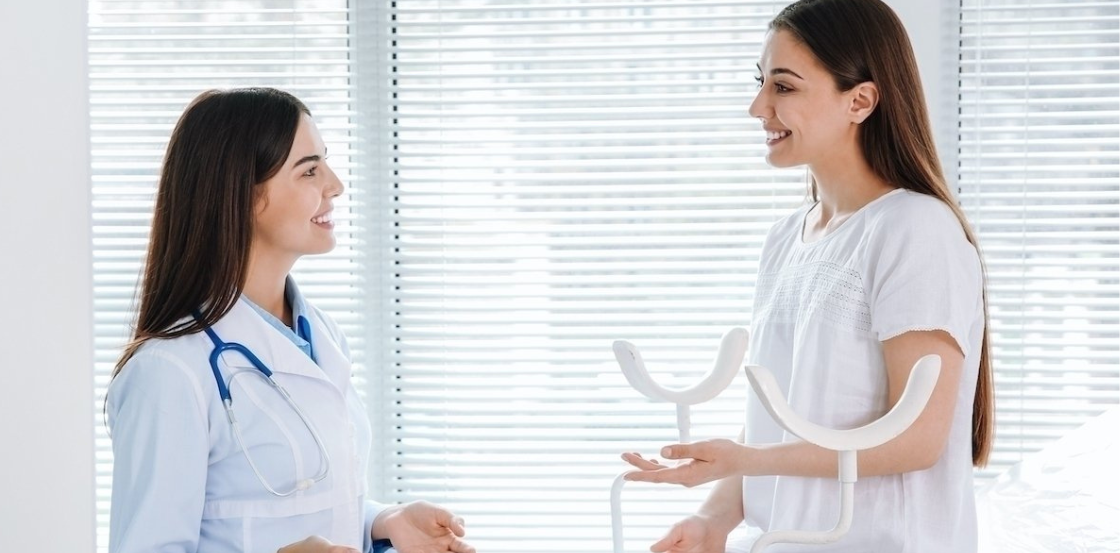Post link copied to clipboard!

This comprehensive guide will reflect on how often you should visit the gynaecologist. As trusted experts in women’s health, we understand the importance of regular check-ups to maintain your well-being. Let’s dive into our advice on gynaecological visits and their importance by highlighting key factors that influence the timing of your appointments.
Maintaining good reproductive health is crucial for women of all ages. Regular visits to the gynaecologist play a quintessential role in the early detection and prevention of potential disorders. Gynaecologist visits offer an opportunity to discuss concerns and receive guidance on contraception, menstrual health, fertility, and overall wellness.
As a woman progresses through different life stages, her gynaecological needs evolve. During the teenage years, schedule an initial visit between ages 13 and 15 and discuss menstrual health and any concerns. During your 20s and 30s, it’s advisable to have annual check-ups, where the focus is on contraception, STI screenings, and overall health.
If you’re planning a pregnancy, preconception visits are essential to assess your health and address any potential obstacles. During pregnancy, you will have frequent visits to monitor your health and the well-being of the growing baby.
Your personal and family medical history can influence the frequency of your Conditions your gynaecologist such as polycystic ovary syndrome (PCOS), endometriosis, or a history of cervical abnormalities may require more frequent monitoring.
Cervical screenings, commonly known as Pap smears, are crucial for detecting abnormal cell changes in the cervix. Women aged 25 to 49 should undergo a Pap smear every three years, while those over 50 can extend the interval to every five years, coupled with an HPV test.
Regular breast self-examinations are vital for the early detection of any abnormalities. Clinical breast exams should be included in your gynaecological visits, particularly for women over 40, as part of a comprehensive breast health strategy.
As menopause approaches, the frequency of gynaecological visits may decrease, but they remain essential. Discuss menopausal symptoms, hormone replacement therapy (HRT), and bone health with your gynaecologist.
If you’re sexually active, routine STI screenings should be part of your gynaecological visits. Open communication with your healthcare provider is essential to ensure you’re receiving appropriate testing and guidance.
In conclusion, regular visits to the gynaecologist are necessary for maintaining optimal reproductive and overall health. The recommended frequency varies based on age, reproductive goals, and medical history. By adhering to these guidelines and establishing a partnership with your gynaecologist, you’re taking proactive steps towards a healthier future.
Every woman’s journey is unique, and personalised care is essential for your well-being. Stay empowered by prioritising your gynaecological health through regular visits and open conversations with your trusted healthcare provider.
Yes. Even if you’re not sexually active, regular gynaecological visits help monitor overall reproductive health. These visits allow discussions on menstrual health, contraception options, and general wellness.
Yes, gynaecological visits are crucial during pregnancy. These appointments monitor the health of both the mother and the developing baby, ensuring a safe and healthy pregnancy journey.
Your reproductive goals influence the timing and frequency of gynaecological visits. If you’re planning to conceive, preconception visits help assess your health and address potential obstacles. These visits are also essential if you’re considering fertility treatments.
Yes, there’s a connection. Gynaecological visits often include routine STI screenings for sexually active individuals. Regular screenings ensure timely detection and appropriate management of STIs.
Absolutely! Gynaecological visits provide an ideal opportunity to discuss and explore various birth
control options based on your preferences and health considerations. Your healthcare provider
can help you make informed decisions.